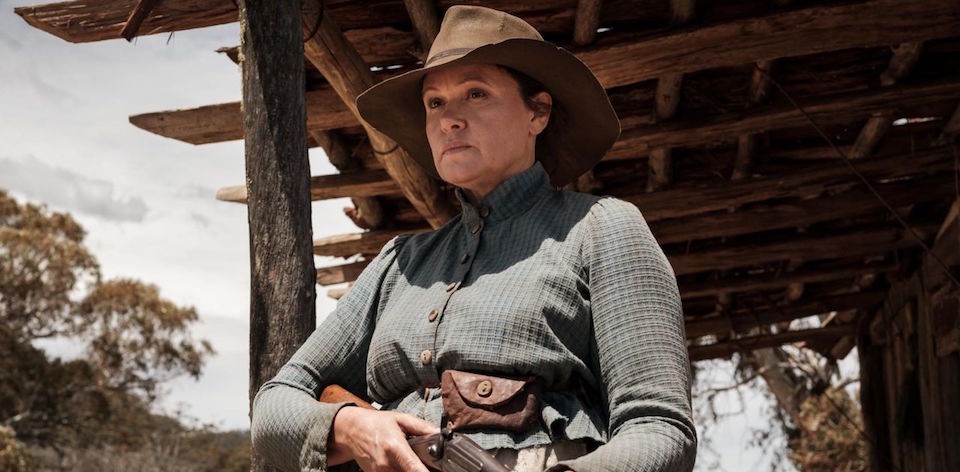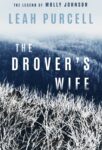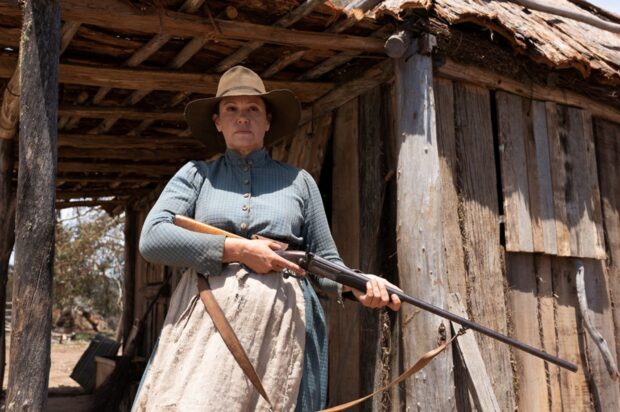The country we now call Australia is slowly coming to terms with the notion of decolonising its official histories. In a year when our national anthem has been changed to reflect the existence of the oldest continuous culture on the planet, perspectives other than the white colonial myth are emerging in our storytelling.
With THE DROVER’S WIFE, proud Goa, Gunggari, Wakka Wakka Murri woman Leah Purcell adapts her powerful play (and later novel) to the screen. A sharply feminist film that considers the Indigenous perspectives of pioneer life, it may be a bridge to the future of Australian stories. By way of comparison, in Henrys Lawson’s original short story, the titular wife isn’t even named: she simply waits for her husband to return. As Purcell said in her statement on the original stage production, “This is not my version of The Drover’s Wife.“
In 1893, the heavily pregnant Molly Johnson (Purcell) and her children struggle in the Snowy Mountain ranges in the absence of her husband, a sheep drover. Following the discovery of Indigenous man Yakada (Rob Collins) on her property, one who is wanted for murder by the authorities, both of their destinies irreparably change.
The history of the Australian western runs deep, from The History of the Kelly Gang (1906) through to the more recent High Ground (2020). Yet, like The Proposition (2005), there is no glorification of the life here: this is Purcell ripping back those fictionalised story layers and exposing them to the harsh light of day. A far cry from the so-called ‘meat pie western,’ Purcell draws on her own family history and reverses the roles of the antagonist. In the original Lawson story, it is the Aboriginal man who “built that wood-heap hollow” allowing a snake to hide. In Purcell’s story, there are far more dangerous men hiding in plain sight.
Running parallel to Molly Johnson’s story is that of Louisa (Jessica De Gouw), the wife of the Sergeant Klintoff (Sam Reid). While her husband seems determined to ‘protect’ Molly from imminent peril, Louisa begins her writing career by publishing articles decrying husbands who routinely beat their wives. As more background emerges about Molly’s husband, and she is paid a visit from some of his mates, we see that the roots of toxic masculinity run deep in the mountains. We know there is no happy ending to be found here, and Purcell doesn’t sugar coat it for a minute.
“My crime, missus? Resisting while black.”
From the opening shot, a deliberately overexposed vista that tips its Akubra to everyone from Leone to Tarantino, Purcell draws her piece out of the confines of the stage and into the real world. Of course, what really drives the film are the outstanding central performances. Purcell, reprising her stage role, conveys a fierce stoicism until the bitter end. When her child is stillborn, her response is a pragmatic one (“I’ll get my hat”) – but you can see every inch of the emotion beneath the surface. Collins, who worked with Purcell on TV’s Cleverman, is a similarly rounded character who walks a fine line between two worlds and finds himself out of place in both of them.
THE DROVER’S WIFE is likely to find an audience amongst fans of feminist westerns in the vein of Meek’s Cutoff or The Homesman. This strong entry in the booming sub-genre of the 21st century is unblinking in its message. It might not be subtle but is impossible to look away from.
2021 | Australia | DIRECTOR: Leah Purcell | WRITERS: Leah Purcell | CAST: Leah Purcell, Rob Collins, Sam Reid, Jessica De Gouw, Malachi Dower-Roberts | DISTRIBUTOR: SXSW 2021, Roadshow Films (AUS), Samuel Goldwyn Films (US) | RUNNING TIME: 109 minutes | RELEASE DATE: 16-20 March 2021 (USA)







